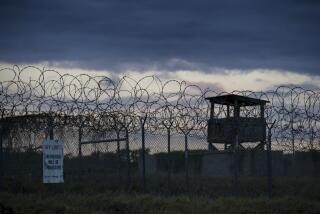Ex-Taliban minister is captured
- Share via
ISLAMABAD, PAKISTAN — Pakistani authorities have arrested the former defense minister of the Taliban, the most senior insurgent leader to be seized in five years, a government official said Thursday.
The Pakistani government issued no immediate official statement about the detention of Mullah Obaidullah Akhund this week in the southern city of Quetta.
Local news reports said Akhund was detained Monday, the day U.S. Vice President Dick Cheney arrived for an unannounced visit to urge President Pervez Musharraf to take more robust steps against Islamic militants finding haven in Pakistan’s tribal region bordering Afghanistan.
A U.S. intelligence official said the Pakistani government had mobilized in an effort to show that it was serious about cracking down on the Taliban and other extremist elements in the country.
“The fact that the Pakistanis captured him and are making this known -- it shows that they are making a commitment, and that they want to demonstrate that they are committed and doing what they can in this area,” said the official, who spoke on condition of anonymity because he was not authorized to discuss the matter.
He added that Akhund’s capture was “a very significant development but it by no means marks the end of the Taliban.”
The U.S. official said that Akhund, in his former Cabinet post, had access to the highest levels of the Taliban.
“As defense minister, was he knowledgeable about Taliban operations, logistics and other matters? Yes,” the U.S. official said. “He was a senior official in the Taliban, not of the level of Mullah Omar but a significant figure nonetheless.”
Several other Taliban figures were arrested in the Quetta raid, a Pakistani government official said on condition of anonymity.
Although Pakistan is a key ally in the U.S.-led fight against the Taliban, the cause is unpopular in many parts of the country, and the Pakistani government has been reluctant to appear too compliant with U.S. demands.
Quetta, the capital of Baluchistan province, which borders Afghanistan, has long been viewed as a staging ground for the Taliban, though the Pakistani government strenuously denies harboring the Islamic militia. Akhund is a close associate of Taliban leader Mullah Mohammed Omar, a fugitive since 2001.
Last year, Taliban fighters staged their strongest push against allied troops in Afghanistan since being driven from power more than five years ago. More than 4,000 people, mostly militants, died in fighting there last year, and both the Taliban movement and North Atlantic Treaty Organization officials have said they expect confrontations to intensify as the winter ends.
Akhund’s arrest is the most high-profile seizure of a Taliban leader inside Pakistan. A spokesman for the militia, Abdul Latif Hakimi, was arrested here in 2005.
The U.S. military has killed some senior Taliban commanders in pinpoint strikes, including Mullah Akhtar Mohammed Osmani, who died in an allied airstrike in December in a remote area of Helmand province, just across the border from Baluchistan.
Mullah Omar, thought to still be a main leader of the insurgency, has eluded capture despite a $25-million bounty on his head.
Much of the militia’s day-to-day command is thought to lie with an associate, Mullah Dadullah, who has made frequent public boasts that the Taliban this spring will make its strongest push yet against NATO-led forces.
josh.meyer@latimes.com
King reported from Islamabad and Meyer from Washington. Special correspondent Mubashir Zaidi in Islamabad contributed to this report.
More to Read
Sign up for Essential California
The most important California stories and recommendations in your inbox every morning.
You may occasionally receive promotional content from the Los Angeles Times.













